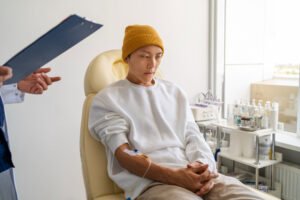Overview
Xeroderma Pigmentosum (XP) is a rare genetic disorder that causes extreme sensitivity to ultraviolet (UV) rays from sunlight. People with XP have a defect in the DNA repair system, making their skin highly vulnerable to UV-induced damage, including sunburns, pigmentation changes, and an elevated risk of skin cancer. Early diagnosis and lifelong sun protection are critical in managing this condition.
What is
Xeroderma Pigmentosum is an autosomal recessive genetic condition characterized by a malfunction in the body’s ability to repair DNA damage caused by UV light. This failure leads to cumulative skin damage, resulting in premature skin aging and a significantly increased risk of skin cancers, including melanoma and squamous cell carcinoma. XP can also affect the eyes and, in some cases, the nervous system.
Symptoms
- Severe sunburns after minimal sun exposure
- Freckling in sun-exposed areas at an early age
- Dry, scaly skin (xeroderma)
- Hyperpigmentation or hypopigmentation
- Skin thinning and premature aging
- Development of actinic keratoses and skin cancers
- Eye sensitivity, redness, dryness, or growths on the eyelids
- In some cases, progressive neurological degeneration (e.g., hearing loss, poor coordination, intellectual disability)
Causes
XP is caused by mutations in any of several genes (such as XPA through XPG) responsible for repairing damaged DNA, specifically the nucleotide excision repair pathway. When this repair system fails, UV-induced DNA damage accumulates, causing the skin cells to become cancerous or dysfunctional.
Risk Factors
- Genetic inheritance: XP follows an autosomal recessive pattern, meaning both parents must carry a defective gene
- Consanguinity: Higher risk in populations where consanguineous marriages (between blood relatives) are common
- Geographic clusters: XP is more frequently reported in North Africa, the Middle East, and parts of Asia
- Family history: Having siblings with XP increases the likelihood
Complications
- Multiple skin cancers at a very early age, often in childhood
- Eye damage such as keratitis, cataracts, and eyelid cancers
- Disfigurement due to repeated surgeries or tumor removals
- Neurological impairment in 20–30% of patients, which can lead to cognitive decline, muscle stiffness, or loss of motor control
- Social and psychological distress due to chronic sun avoidance and visible skin changes
Prevention
Since XP is a genetic condition, it cannot be prevented after birth. However, steps can be taken to delay complications:
- Strict avoidance of UV exposure: Use high-SPF sunscreen, UV-protective clothing, hats, and sunglasses
- Indoor UV protection: Install UV-blocking films on windows and avoid artificial sources of UV (e.g., tanning beds)
- Regular dermatologic screenings for early detection of skin abnormalities
- Genetic counseling for families with a history of XP
- Neurological and ophthalmologic monitoring for early signs of complications
Treatment Options in Korea
South Korea offers comprehensive medical support for managing XP, focusing on:
- Dermatologic care: Early removal of precancerous or cancerous lesions using techniques such as cryotherapy, laser ablation, or minor surgery
- Photoprotection education: Detailed patient and family counseling on UV safety
- Eye care: Ongoing ophthalmologic exams and treatment of UV-related eye conditions
- Genetic testing and counseling: Available to confirm diagnosis and support family planning
- Neurological assessment: For patients with central nervous system involvement, ongoing monitoring and therapy are available
While there is no cure for XP, early detection, lifelong photoprotection, and multidisciplinary medical care can greatly improve quality of life and reduce the risk of complications.













